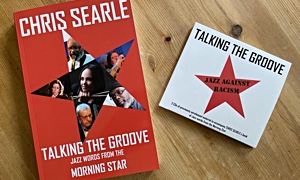Home » Jazz Articles » Book Review » Pops: A Life of Louis Armstrong
Pops: A Life of Louis Armstrong
 Pops: A Life Of Louis Armstrong
Pops: A Life Of Louis ArmstrongTerry Teachout
Paper; 475 pages
ISBN: 978-0-547-38637-9
Mariner Books
2010
The most unputdownable biography of trumpeter/vocalist Louis Armstrong to be written, by a country mile, Pops is also one of the best jazz biographies on the shelves. Modestly subtitled A Life Of Louis Armstrong rather than The Life Of..., this is the only book about Armstrong anyone but the hungriest devotee will ever need. First published in hardback in 2009, Pops is now available in paperback too. It's a page turner whose easy readability belies the scholarship behind it.
The crowning achievements of the book are its uniquely rounded portrayals of Armstrong as an artist and as an Afro American. As an artist, author Terry Teachout believes that at his best Armstrong the singer was as vital a musician as Armstrong the trumpeter; he is wholly sympathetic to Armstrong's refusal to see either one of those forms of expression as more artistically valuable than the other.
Only recently has this revisionist take on Armstrong's music started to become accepted; since the 1930s and his first recordings with big bands, many jazz purists have written Armstrong off as a sell-out, their distaste reaching its apogee with his later, out and out pop hits such as 1963's "Hello, Dolly!" As late as 1983, in his biography Louis Armstrong: An American Genius (Oxford), James Lincoln Collier was writing of his subject as a fatally flawed artist who had "failed his talent." Teachout, self-evidently armed with a better pair of ears than Collier, is persuasive with the contrary view.
Teachout also debunks any lingering perceptions of Armstrong as an Uncle Tom figure, who didn't speak out in support of the civil rights movement of the 1950s and 1960s for fear of alienating white audiences. Teachout demonstrates, with compelling new evidence, that Armstrong was proud to be an Afro American and such a successful one (Collier wrote of him as condemned by "a sense of his own worthlessness"), and that he worked hard to improve the prospects of his race.
Teachout's trump card has been access to a wealth of information not previously available to biographers—including 650 reels of tape recordings privately made by Armstrong during the last quarter century of his life, on which he reminisces about the past, comments on current events, talks with friends and considers his life and music. The tapes, along with many private journals Armstrong wrote which have not previously been available, but to which Teachout has had access, shed new light on many facets of Armstrong's life, including his relationship with his longtime manager, Joe Glaser, his experiences with Hollywood and the mob connections which blighted the emergent and final periods of his career. Armstrong's relationship with marijuana, which he smoked daily from early adulthood until close to his death, if not right up to his death, is also referred to more regularly, and less judgementally, than before. (One of the reasons Armstrong looks so happy on the front cover of the 1956 Columbia album Ambassador Satch could be that the briefcase in his right hand contains half a pound of the finest gage, just purchased).
The book ends, beautifully, with this: "Faced with the terrible realities of the time and place into which he had been born, (Armstrong) did not repine, but returned love for hatred and sought salvation in work. Therein lay the ultimate meaning of his epic journey from squalor to immortality: his sunlit, hopeful art, brought into being by the labor of a lifetime, spoke to all men in all conditions and helped make them whole."
And the previous 474 pages are just as good.
< Previous
Genius: The Ultimate Collection
Next >
Questions
Comments
About Louis Armstrong
Instrument: Trumpet and vocals
Related Articles | Albums | Photos | Similar ToTags
For the Love of Jazz
 All About Jazz has been a pillar of jazz since 1995, championing it as an art form and, more importantly, supporting the musicians who create it. Our enduring commitment has made "AAJ" one of the most culturally important websites of its kind, read by hundreds of thousands of fans, musicians and industry figures every month.
All About Jazz has been a pillar of jazz since 1995, championing it as an art form and, more importantly, supporting the musicians who create it. Our enduring commitment has made "AAJ" one of the most culturally important websites of its kind, read by hundreds of thousands of fans, musicians and industry figures every month.























